-
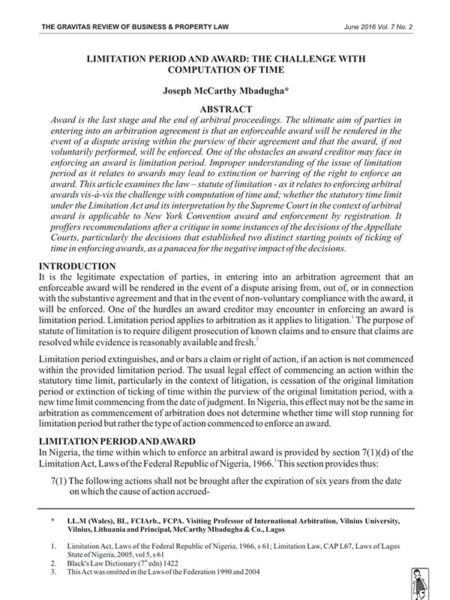
Limitation Period and Award: The Challenge with Computation of Time
0₦2,500.00Joseph Mbadugha, SAN, Visiting Professor of International Arbitration, Vilnius University, Lithuania and Principal, McCarthy Mbadugha & Co confronts a daunting issue in “Limitation Period and Award: The Challenge with Computation of Time.” He argues that as the courts have been strict in holding that, in enforcement of arbitral award, limitation period runs from the date of accrual of the original cause of action in the arbitration agreement and not from the date of the arbitral award, there could be two ways of enforcing an arbitral award with two distinct ticking clocks: enforcement of an award as a judgment of the court and enforcement as a breach of implied promise to perform a valid award. In the former, time begins to run from the date of accrual of the original cause of action that gave rise to the arbitration, while in the latter, time runs from the date the award debtor refused to perform the award.
-
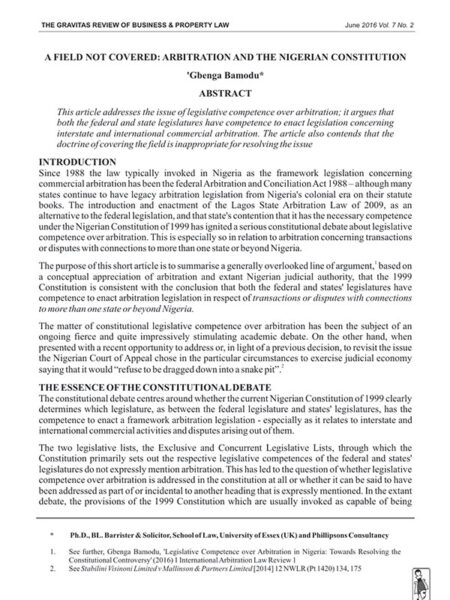
A Field Not Covered: Arbitration and The Nigerian Constitution
0₦2,500.00Dr Gbenga Bamodu of the School of Law, University of Essex (UK) in a counterpose to a previous article published in The Gravitas Review argues in “A Field Not Covered: Arbitration and The Nigerian Constitution” that the doctrine of “covering the field” is inappropriate in the context of legislative competence over arbitration in Nigeria in holding that states’ legislatures cannot legislate on arbitration in view of the federal Arbitration and Conciliation Act 1988. Synthesising a range of sources including decided cases, he posits that states’ legislatures also have legislative competence over arbitration concerning interstate or international transaction disputes.
-
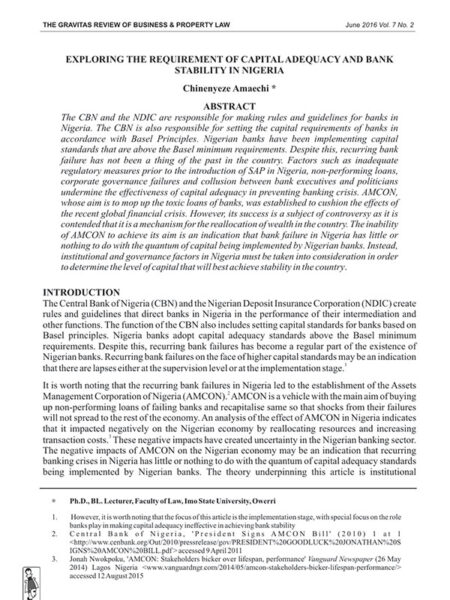
Exploring the Requirement of Capital Adequacy and Bank Stability in Nigeria
0₦2,500.00Dr Chinenyeze Amaechi of the Faculty of Law, Imo State University, Owerri in his article “Exploring the Requirement of Capital Adequacy and Banking Stability in Nigeria” explores the world of bank failures beyond capital adequacy. He argues that in spite of the fact that Nigerian banks have been implementing capital standards that are above the Basel minimum requirements, bank failures are still threateningly close due to inadequate regulatory measures, high rate of non-performing loans and corporate governance failures. He contends that the macroprudential and stabilising impact of the Asset Management Corporation of Nigeria, AMCON, in mopping up banks’ toxic loans has been blighted by controversies surrounding transparency issues and in leaving rescued banks without working capital.
-
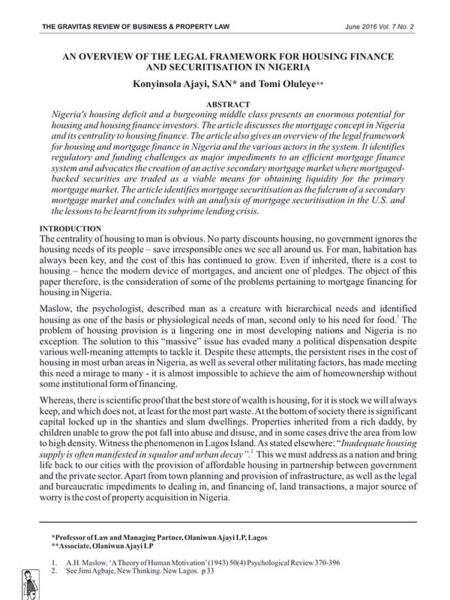
An Overview of the Legal Framework for Housing Finance and Securitisation in Nigeria
0₦2,500.00Professor Konyinsola Ajayi, SAN & Tomi Oluleye of Olaniwun Ajayi LP in their article, “An Overview of the Legal Framework for Housing Finance and Securitisation in Nigeria” discuss the mortgage concept in Nigeria and its centrality to housing finance. They give an overview of the legal framework for housing and mortgage finance in Nigeria and the various actors in the system. They identify how the Land Use Act and funding challenges hamper an efficient mortgage finance system and advocate the creation of an active secondary mortgage market where mortgaged-backed securities are traded as a viable option in obtaining liquidity for the primary mortgage market. They recognise mortgage securitisation as the fulcrum of a secondary mortgage market and conclude with an analysis of mortgage securitisation in the U.S and the lessons to be learnt from its subprime lending crisis.
-
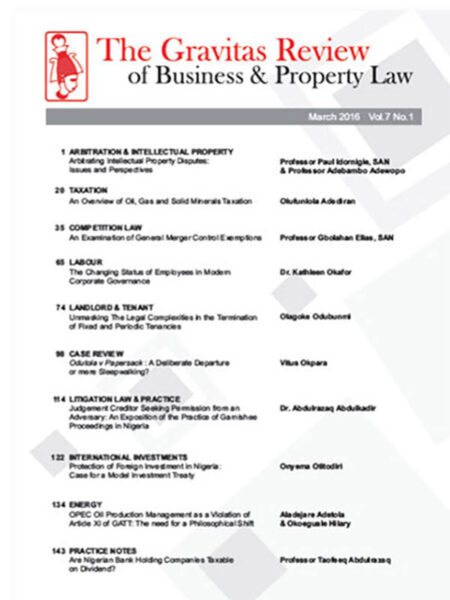
The Gravitas Review of Business & Property Law Vol.7 No.1 -Print
0₦5,000.00In this issue of The Gravitas Review of Business & Property Law Vol.7 No.1, there are well researched articles on:
- Arbitration & Intellectual Property
- Taxation
- Competition Law
- Labour
- Landlord & Tenant
- Case Review
- Litigation Law & Practice
- International Investments
- Energy
- Practice Notes
-

The Gravitas Review of Business & Property Law Vol.7 No.1 -E-Book
0₦5,000.00In this issue of The Gravitas Review of Business & Property Law Vol.7 No.1, there are well researched articles on:
- Arbitration & Intellectual Property
- Taxation
- Competition Law
- Labour
- Landlord & Tenant
- Case Review
- Litigation Law & Practice
- International Investments
- Energy
- Practice Notes
-

The Gravitas Review of Business & Property Law Vol.7 No.1
0₦5,000.00In this issue of The Gravitas Review of Business & Property Law Vol.7 No.1, there are well researched articles on:
- Arbitration & Intellectual Property
- Taxation
- Competition Law
- Labour
- Landlord & Tenant
- Case Review
- Litigation Law & Practice
- International Investments
- Energy
- Practice Notes
-
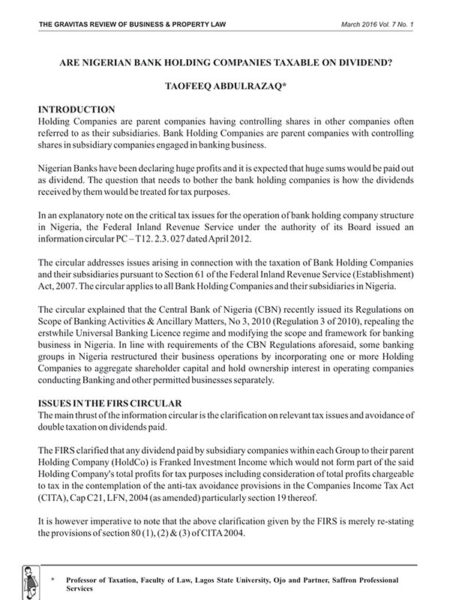
Are Nigerian Bank Holding Companies Taxable on Dividend?
0₦2,500.00Professor Taofeeq Abdulrazaq, Provost, Nigerian Academy of Taxation and Partner, Saffron Professional Services in his article “Are Nigerian Bank Holding Companies Taxable On Dividend?” examines the provisions of the Companies Income Tax Act and FIRS Circulars on Franked Investment Income and the liability of holding companies for tax on dividend paid by their subsidiary companies.
-
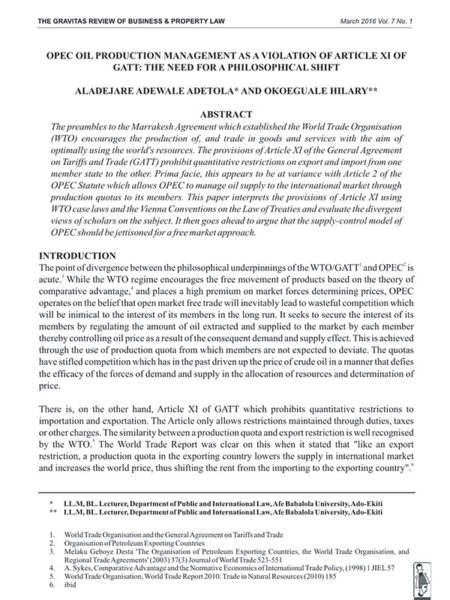
OPEC Oil Production Management as a Violation of Article XI of GATT: The Need for a Philosophical Shift
0₦2,500.00Aladejare Adetola and Okoeguale Hilary of the Department of Public and International Law, Afe Babalola University, Ado-Ekiti in their article “OPEC Oil Production Management as a violation of Article XI of GATT: The Need for a Philosophical Shift” analyses contending positions on whether OPEC oil production quota violates Article XI of the General Agreement on Tariffs and Trade (GATT) which prohibits quantitative restrictions on export and import from one member state to the other. Interestingly, the decisive element in the controversy may be whether oil is a “good” or “product”.
-
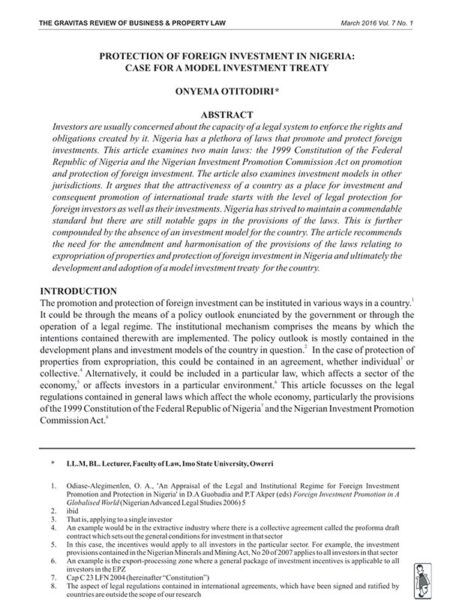
Protection of Foreign Investment in Nigeria: Case for a Model Investment Treaty
0₦2,500.00Onyema Otitodiri, Lecturer, Faculty of Law, Imo State University, Owerri in “Protection of Foreign Investment in Nigeria: Case for a Model Investment Treaty” analyses the state of Nigerian law on foreign investment, its promotion, protection and probable expropriation. He makes a case for the adoption of a model investment treaty to harmonise the provision of the laws and standardise treatment of foreign investors.
-
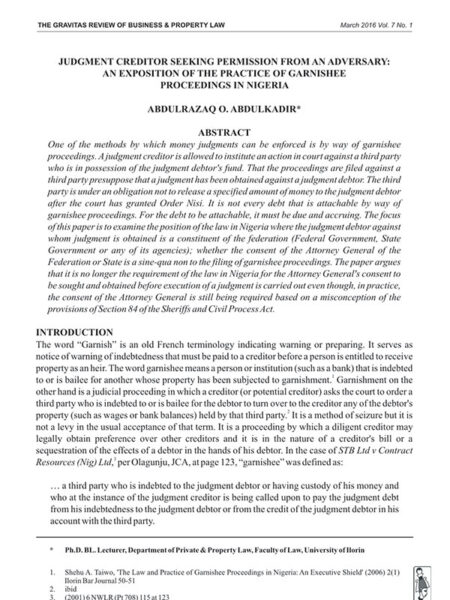
Judgement Creditor Seeking Permission from an Adversary: An Exposition of the Practice of Garnishee Proceedings in Nigeria
0₦2,500.00Dr Abdulrazaq Abdulkadir of the Department of Private & Property Law, University of Ilorin in his article “Judgment Creditor Seeking Permission from an Adversary: An Exposition of the Practice of Garnishee Proceedings in Nigeria” examines the practice of courts requiring judgment creditors seeking to file garnishee proceedings against the government to seek the consent of the Attorney General. He argues that the practice is against the provision of the 1999 Constitution and may be a result of a misconception of the implications of Section 84 of the Sheriffs and Civil Process Act.
-
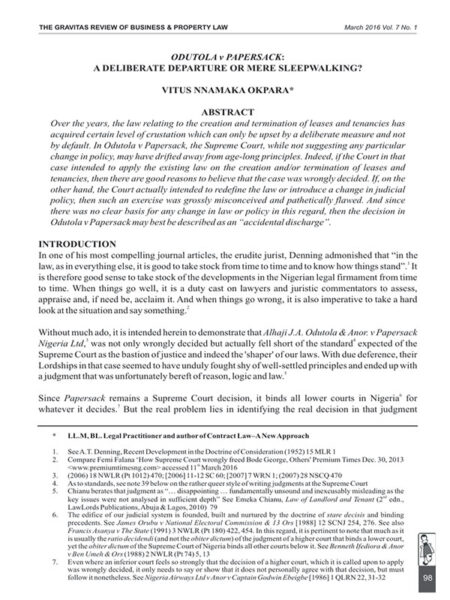
Odutola v Papersack: A Deliberate Departure or mere Sleepwalking?
0₦2,500.00Vitus Okpara, legal practitioner and author of Contract Law–A New Approach, continues the discussion on termination of tenancies in his article “Odutola v Papersack: A Deliberate Departure or Mere Sleepwalking?” In this compelling review, Okpara asks whether the Supreme Court intended to depart from a long line of its previous decisions on creation and termination of tenancies or the decision in Papersack was an “accidental discharge”.
The Gravitas Review of Business & Property Law



